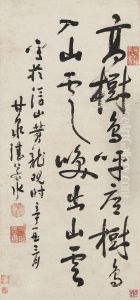Zhan Ruoshui Paintings
Zhan Ruoshui was a prominent Chinese philosopher, educator, and scholar, best known for his contributions to Confucianism during the Ming dynasty. Born in 1466, in the town of Fenyi, Jiangxi Province, Zhan was a leading figure among the Neo-Confucian scholars of his time. His life and work were deeply influenced by the teachings of Confucius and Mencius, and he was dedicated to the revival and reinterpretation of Confucian thought, which he believed was essential for the moral and social well-being of society.
Zhan Ruoshui's scholarly pursuits were marked by his deep commitment to education and moral development. He passed the imperial examinations with high honors, which paved the way for his career in the bureaucratic system of the Ming dynasty. However, Zhan is most remembered for his role as an educator. He founded the White Deer Hollow Academy (Bailudong Shuyuan), which became a leading center for Confucian studies and attracted students from across China. His approach to education emphasized the importance of personal virtue, ethical conduct, and the cultivation of benevolence, righteousness, propriety, and wisdom.
Throughout his life, Zhan Ruoshui engaged in extensive scholarly work, writing and commenting on a wide range of Confucian classics. He was deeply concerned with the practical application of Confucian principles in governance and personal life. Zhan advocated for a government that was guided by moral integrity and benevolence, and he believed that education was the foundation for creating a virtuous and harmonious society. His thoughts and teachings contributed significantly to the development of Neo-Confucianism during the Ming dynasty.
Zhan Ruoshui's impact extended beyond his lifetime, influencing subsequent generations of Confucian scholars and educators. His dedication to the revival of Confucian values and his efforts in education reform left a lasting legacy in Chinese intellectual and cultural history. Zhan Ruoshui passed away in 1560, but his works and the institutions he established continued to inspire and educate for centuries to come. His life and contributions are a testament to the enduring relevance of Confucian thought in shaping the moral and ethical foundations of society.
